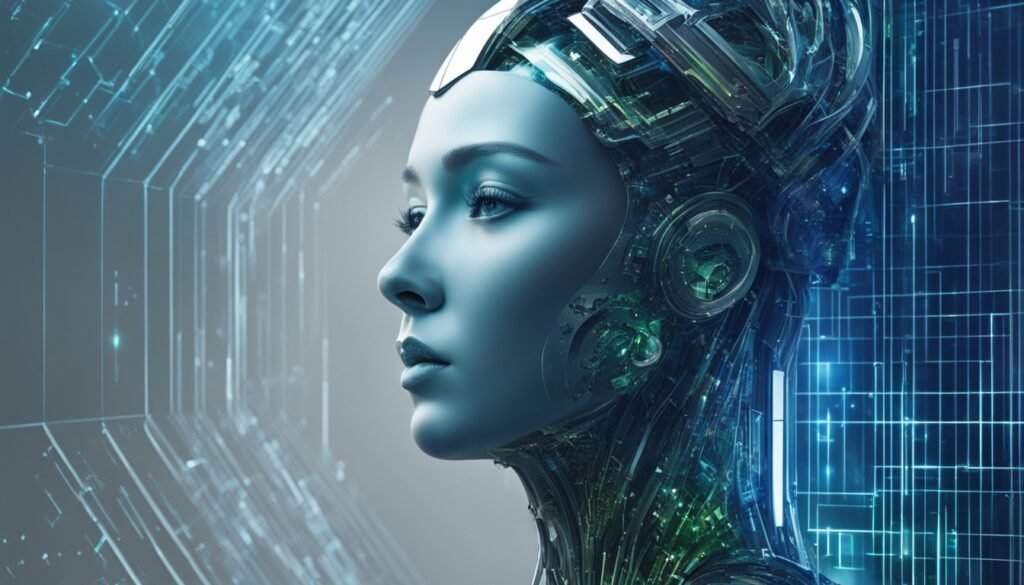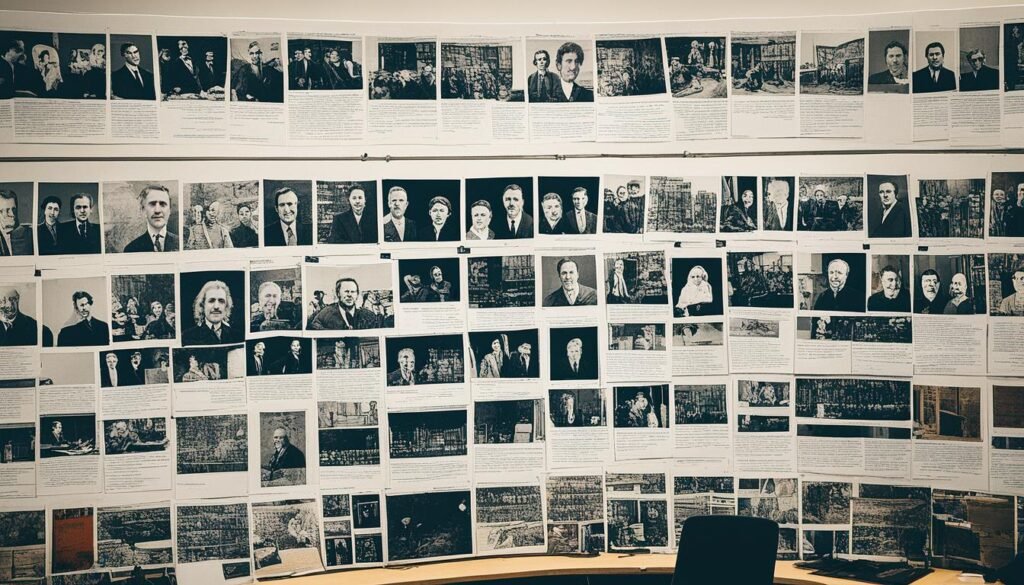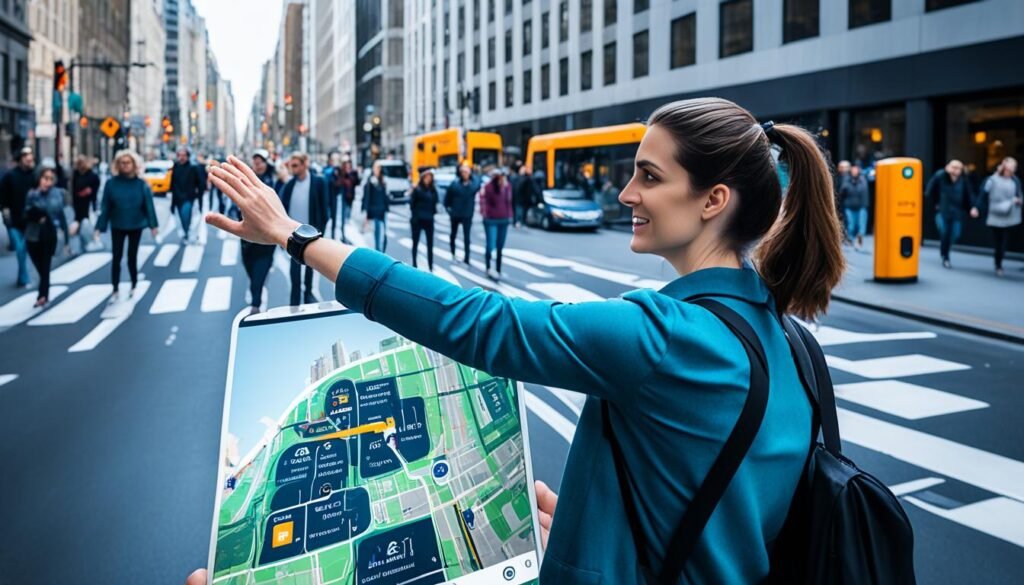Imagine a world where technology makes our lives better and solves big problems. This world is possible thanks to artificial intelligence (AI). AI can handle huge amounts of data, spot patterns, and make smart choices. It’s changing everything from healthcare and education to making our planet safer.
Key Takeaways
- AI is a powerful tool that can address global problems and create a better world.
- AI is transforming industries and improving decision-making across various sectors.
- Embracing AI technology can provide a competitive advantage and drive innovation.
- Responsible development and deployment of AI is crucial to ensure ethical and equitable outcomes.
- AI can enhance accessibility, democratize access to information, and preserve languages.
What is Artificial Intelligence?
Artificial Intelligence (AI) is changing the world. It means machines that act like humans, thinking, judging, and making plans. These intelligent AI systems use real-time data to make decisions. They look at lots of information, understand it fast, and act on it.
Modern AI uses machine learning and data analytics to get better over time. This lets AI learn and adapt as it goes, making it smarter and more accurate. The goal of intentional AI is to solve specific problems and improve our lives.
Intentionality, Intelligence, and Adaptability
Artificial intelligence is all about being intentional, smart, and adaptable. It’s not just a tool; it’s a dynamic system that can solve complex problems. By using lots of data and smart algorithms, AI can make smart choices, predict outcomes, and automate tasks faster and more accurately than humans.
“AI is already achieving superhuman performance in many areas, and capability improvements are expected by 2030. Experts highlighted the importance of addressing the societal implications of AI, such as civil rights, economic inequalities, surveillance, and human well-being.”
AI is set to change our lives and societies in big ways. It can improve healthcare, education, supply chains, and finance. The qualities of artificial intelligence will help create a better, fairer future for everyone.

Preserving Languages with AI
In today’s digital world, English and a few other languages are taking over. But, artificial intelligence (AI) is now helping to save smaller languages. This is crucial for preserving our linguistic diversity.
The government of Iceland is working with OpenAI to save the Icelandic language. They’re using the GPT-4 language model for this. A team is training GPT-4 on Icelandic grammar and culture. This lets Icelanders use OpenAI’s tools in their native language.
AI has big potential for saving languages beyond Icelandic. UNESCO says over 40% of the world’s languages are at risk. AI is being used around the world to document and teach endangered languages.
At SOAS University of London, a program has recorded over 4,000 hours of audio and video in more than 300 languages. The Wikitongues project has used AI-powered speech recognition to collect videos in over 1,000 languages.
In New Zealand, Te Hiku Media built AI tools for the Māori language in 2018. In Canada, the FirstVoices initiative has made apps with AI-powered speech recognition. These apps help Indigenous language learners practice through games and lessons.
AI is a powerful tool for saving smaller languages. It helps with more than just documenting languages. Generative AI can learn from lots of language data. This lets it create language learning materials and help with language revitalization.
As we move forward in the digital age, AI solutions give us hope. They help us fight to save the linguistic diversity that has shaped our world for so long.

Democratizing Access to Literature
In today’s world, making literature more accessible is key to giving people knowledge and enriching their lives. Thanks to AI technologies, we’re seeing a big change in how we get to read and enjoy books.
Project Gutenberg’s Open Audiobook Collection
Project Gutenberg and Microsoft have teamed up to create free AI-generated audiobooks. They use text-to-speech tech to turn over 5,000 classic books by famous authors like William Shakespeare and Jules Verne into audiobooks. This makes literature more available to everyone.
AI generating audiobooks has changed how we experience stories. Now, you don’t need a professional narrator to enjoy a book. AI making literature accessible lets anyone with a device dive into classic stories and poems easily.
The project gutenberg open audiobook collection shows how tech can make knowledge available to all. It gives free, high-quality audiobooks to everyone. This helps people from different backgrounds explore literature, making them more informed and engaged.
“The world’s great literature has been digitized, searchable, and made available to everyone.”
– Project Gutenberg
As AI technology grows, the future of literature looks bright. It will be more open, welcoming, and changing lives. The idea of making literature for everyone is becoming real, and it’s an exciting time for readers, writers, and learners.
Enhancing Accessibility for the Visually Impaired
Be My Eyes is working with OpenAI to create a new tool. This tool uses GPT-4 to help people who are blind or have low vision. It can understand and respond like a human volunteer.
This tool makes everyday tasks easier. It helps users shop online, use social media, and enjoy art. Things that were hard or impossible before are now possible.
Groups like OKO from New York and Envision from the Netherlands are leading the way. They show how AI can improve life for the visually impaired. As technology gets better, AI will make Be My Eyes even more helpful.
“AI technology is transforming the lives of individuals who are blind or visually impaired by offering greater independence and accessibility.”
Using AI in accessibility raises tough questions. Chancey Fleet from the New York Public Library talks about the balance between helping people and protecting their privacy. The goal is to make life better for those with visual impairments.
Be My Eyes and ChatGPT are making big strides in inclusive technology. The Virtual Volunteer uses AI to help with tasks that need visual skills. This means users can do more on their own, without needing human help.
The future of AI in accessibility is bright. As technology gets better, the visually impaired will have more freedom and can fully join in with the world.

why ai will save the world
Artificial Intelligence (AI) is changing the world for the better. It’s solving big global problems. From fighting climate change to making education available to everyone, AI is a key tool for progress.
AI can tackle big issues by solving global problems. It looks at huge amounts of data, finds patterns, and gives insights. This helps in making better decisions on sustainability and climate change. For instance, AI can predict and lessen the effects of natural disasters, improve energy use, and find new ways for renewable energy.
AI is also changing healthcare, finance, and national security. In healthcare, AI helps find diseases early, create custom treatment plans, and improve patient care. In finance, AI spots fraud, makes loan decisions, and helps with high-speed trading. The military uses AI to analyze lots of data and videos, making their decisions better.
As AI gets better, it will be key for solving global problems. It will help make the world more sustainable, fair, and prosperous. By using AI, we can face big challenges and make tomorrow better.

“The true promise of AI is not just to create powerful, capable machines, but to amplify and augment human intelligence and capabilities to improve the human condition.”
Adding AI to different areas can boost the economy and productivity. A PwC study says AI could add $15.7 trillion to global GDP by 2030. This would be a 14% increase, mainly in places like China, North America, and Europe.
- AI can make humans smarter and more capable, leading to breakthroughs in medicine, fighting climate change, and exploring space.
- Using AI will bring many benefits, like AI tutors for kids, AI helpers for people, and AI partners for workers.
- AI can speed up scientific discoveries, tech advancements, and medical breakthroughs by helping understand nature’s laws.
The AI revolution is showing us how this tech can change the world for the better. By using AI, we can solve global problems, grow the economy, and make life better for everyone.
AI in Finance and National Security
Artificial Intelligence (AI) is changing the finance and national security fields. It brings new chances and challenges. In finance, AI helps make loan decisions better by looking at more than just credit scores. This “AI in finance” tech lowers the risk of loans going bad.
AI is also changing investment management. “Robo-advisers” use AI to create custom investment plans. This makes top investment advice available to more people, not just the wealthy.
In national security, AI is key for analyzing data and making decisions. The U.S. military uses AI in Project Maven to look through lots of data from drones and other sources. This helps the military spot and act on threats faster.
AI is also fighting fraud in finance. Banks use AI to find unusual patterns in transactions quickly. This “AI fraud detection” helps keep the financial system safe.
AI is also changing high-frequency trading. “AI high-frequency trading” algorithms can make trades super fast. They take advantage of quick market changes to improve investment results.
As AI in finance and national security grows, it’s clear it’s a game-changer. It opens up new ways to make decisions, protect our countries, and manage money better.
Ethical Considerations and Responsible AI Development
As AI becomes more common, we face big ethical challenges. We need to make sure it’s developed and used responsibly. Issues like algorithmic bias, transparency, and human oversight are key to making AI good for everyone.
Addressing Bias, Transparency, and Human Oversight
AI can be biased, leading to unfair results. Using diverse and inclusive data helps fix this. Being clear about how AI makes decisions is also vital for trust.
It’s important to balance AI’s automation with human control. We need to set clear AI rules, listen to bias concerns, and have humans check AI. This stops AI from being misused.
By tackling these ethical issues, we can make AI better for everyone. Working together is key. We need transparent, fair, and human-focused AI that gains public trust.
“The development of full artificial intelligence could spell the end of the human race…. It would take off on its own, and re-design itself at an ever-increasing rate. Humans, who are limited by slow biological evolution, couldn’t compete, and would be superseded.”
– Stephen Hawking, Theoretical Physicist
Measuring the Societal Impact of Research with ChatSDG
Business schools today are expected to show they care about making a difference. The ChatSDG tool is a big step forward. It was made by the Haub School of Business at Saint Joseph’s University and Cabells Scholarly Analytics. This tool helps measure how research matches up with the United Nations Sustainable Development Goals (SDGs).
ChatSDG uses AI to make reports for schools. These reports show how the research of faculty affects society and meet requirements for accreditation. It looks at journals and articles to see how well they match the 17 SDGs, giving them a score from 0 to 5.
With ChatSDG, schools can see how many articles their faculty write for high-SDGII journals. They can also see which SDGs are most important in their research. The tool offers advice on making articles more impactful and applying research in real-world settings to help the SDGs.
| Feature | Benefit |
|---|---|
| SDGII Ratings | Measure alignment with the 17 SDGs on a scale of 0 to 5 |
| Research Impact Reports | Generate AACSB Standard 8 reports to showcase research impact |
| Journal Quality Indicators | Identify reputable journals versus predatory or rejected ones |
| Responsible Research Principles | Integrate the RRBM network’s seven Principles of Responsible Science |
ChatSDG works with the RRBM network to check research impact. It uses the seven Principles of Responsible Science. This makes sure the research is looked at responsibly and aligns with good business practices.
ChatSDG will be shown at AACSB’s 2024 International Conference and Annual Meeting. It’s set to change how business schools get accredited and review research. It will focus more on chatsdg, measuring research impact, and ai and sustainable development goals.
“Measuring the impact of research on society is a challenging task, and AI tools like ChatSDG have the potential to go beyond simply aligning content with sustainability goals.”
– Misha Teplitskiy, Assistant Professor, University of Michigan
Conclusion
AI is changing every sector and tackling big world challenges. It helps save endangered languages, makes books available to everyone, and helps the visually impaired. AI is a strong tool for doing good in the world.
But, we must think about ethics and use AI responsibly. It’s making a big difference in finance, security, healthcare, and the environment.
The future looks bright for AI, making the world better for everyone. Governments and leaders need to keep up with AI’s fast pace. They should invest in it to tackle the challenges it brings.
Teaching AI to kids in schools is key to getting ready for an AI-filled future. This will help the next generation understand and use AI wisely.
AI researchers must share their work with everyone. They should talk about both the risks and the chances AI brings. The goal is to make AI help people, not harm them.
By working together and having clear communication, we can make sure AI is used for good. This way, AI can help our communities in big ways.
FAQ
What is Artificial Intelligence (AI)?
Artificial Intelligence (AI) is a technology that changes how we use information and make decisions. It’s used in many areas, like finance, healthcare, and transportation. This tech helps us make better choices by analyzing data.
What are the key qualities of AI?
AI means machines that act like humans, thinking and making decisions. They use real-time data to make choices. This includes analyzing information quickly and acting on it.
How is AI being used to preserve endangered languages?
Iceland is working with OpenAI to save the Icelandic language. They’re training AI on Icelandic grammar and culture. This lets Icelanders use OpenAI’s tools in their native language.
How is AI democratizing access to literature?
Project Gutenberg and Microsoft teamed up to make 5,000 books into free audiobooks. AI voices read these classics, making books more available to everyone.
How is AI enhancing accessibility for the visually impaired?
Be My Eyes and OpenAI created a tool that helps the visually impaired. It uses AI to understand images and text, making daily tasks easier. This tool is more effective than current screen readers.
How is AI being used in finance and national security?
In finance, AI helps with loan decisions and creates personalized investment plans. It also spots fraud by finding unusual patterns. The US military uses AI to analyze data from drones for national security.
What are the key ethical considerations for AI development?
Ethical issues include bias in algorithms and the need for human oversight. It’s important to regulate AI and address bias. Companies and researchers must ensure AI is used responsibly.
How can AI help measure the societal impact of research?
ChatSDG is an AI tool that measures research impact on business and society. It uses the UN’s Sustainable Development Goals. This helps schools show how their research helps society and meets accreditation standards.
